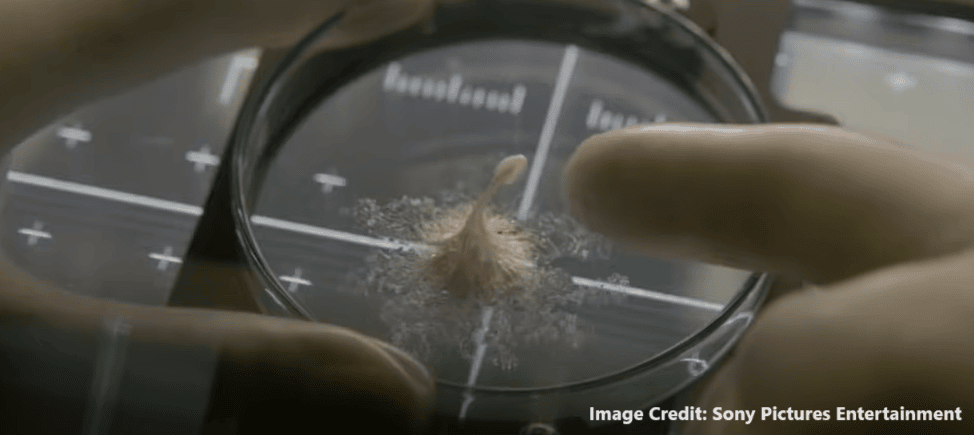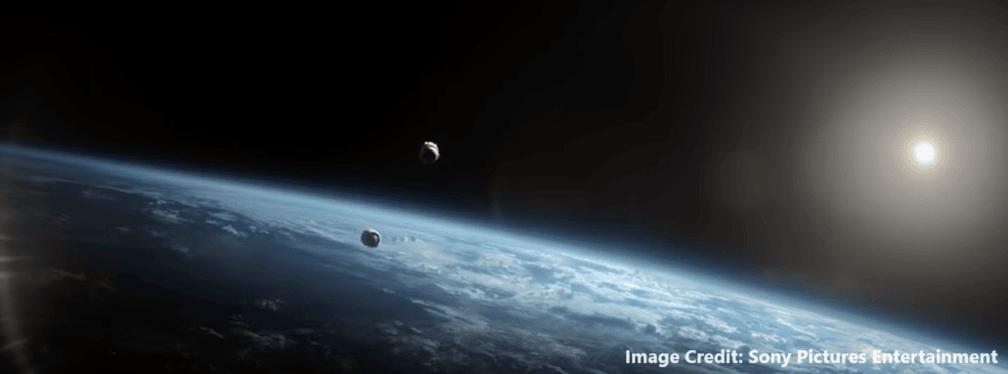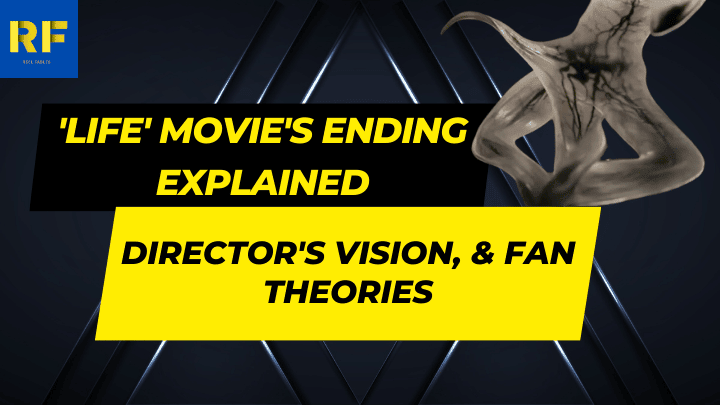Remember that sci-fi horror flick from 2017, "Life," featuring Jake Gyllenhaal, Ryan Reynolds, and Rebecca Ferguson? Well, if you're like me, you were probably left with your jaw hanging open at the end of that movie, trying to process what just happened.
Don't worry; you're not alone in your confusion. Let's break down the ending of "Life" and make sense of the chaos that unfolded in those last moments.
What Happens In The End Of 'Life' Movie?
In the final act of the movie, we're left with only two survivors, David (played by Gyllenhaal) and Miranda (portrayed by Ferguson), desperately trying to prevent a catastrophic alien invasion of Earth. Calvin, the hostile Martian organism, has grown into a monstrous threat, and it's hungry for more than just a snack. It's hungry for our whole planet!
Despite their valiant efforts, including burning Calvin with a flamethrower and attempting to eject it from the space station, David and Miranda know they're in a dire situation. Their only way to save humanity is to prevent Calvin from reaching Earth. So, here comes the heart-pounding twist.
David hatches a plan. He sacrifices himself by luring Calvin into an escape pod and setting it on a course for deep space. Meanwhile, Miranda takes another pod to get back to Earth to warn everyone about the potential Martian menace. The tension builds as David successfully lures Calvin into his pod, and both pods are launched, but they're not out of the woods yet.
As the pods detach, they get smacked by some debris, sending one of them into deep space. But, surprise, it's not what you think! The real shocker comes when we see Vietnamese fishermen rushing to the Earthbound pod. And guess who's inside? David, covered in some strange cocoon-like material. That's right, it was Miranda's pod that was sent hurtling into the void, with her fate sealed as she screams in the distance.
The ending of "Life" leaves us with David pleading with the fishermen not to open his pod, but we're left hanging as they pry it open, revealing who knows what. Earth is in peril, and the future is uncertain.
The Twist In The 'Life' Movie's Ending
As Vietnamese fishermen gather around David's Earthbound pod, ready to unravel the mystery inside, we get hit with the kicker. It turns out that David is inside the pod, covered in a peculiar cocoon-like substance. That's when it hits you: Miranda's pod, the one that was supposed to return to Earth and warn of the Martian threat, is the one spiraling into the abyss. Yes, the one carrying Miranda. And you're left wondering how the tables turned so suddenly.
"Life" serves up a brutal dose of reality that reminds us of the unpredictable nature of the universe. Miranda and David's selfless efforts to save Earth from an alien menace ultimately prove futile. Miranda faces the cold, lonely depths of space, while David can only watch helplessly as the dangerous new life form takes its first steps on our planet.
In fact, the ending adds a whole new layer to the movie's title. While we initially thought "Life" referred to the new life form, Calvin, it also carries a deeper connotation. It speaks to how Calvin feeds on other life and ultimately threatens all life on Earth.
There's something oddly satisfying about not having all the answers. While "Life" may not have been a blockbuster hit, it's clear that the ending wasn't meant to set up a sequel. It's more akin to the conclusion of "The Thing," hinting at an alien species infiltrating populated areas, but it leaves us to imagine what happens next, and sometimes, that's even more effective than seeing it unfold.
Director's Insight on the 'Life' Movie's Ending
You might be wondering what drove the director, Daniel Espinosa, to make such a bold move in a big blockbuster with A-list stars like Jake Gyllenhaal and Ryan Reynolds. Well, here's the scoop.
Espinosa drew inspiration from the noir genre, known for its cynical finales. He believed that this ending was crucial to the heart of "Life," and he made it clear to the producers from the get-go. In his words, "I completely understand that this ending might not be the preferable choice, but for me, it was a fundamental part of the reason I wanted to do the movie." His boldness paid off, as the producers fully supported his vision.
It's clear that this bleak movie ending stands out, offering a departure from the more mainstream, predictable conclusions we often see. It displays Espinosa's commitment to delivering a unique and thought-provoking experience for the audience.
The Surprise Ending of Ryan Reynolds & Jake Gyllenhaal's 'Life,' Explained
The surprise ending of "Life" is an integral part of the storytelling. Screenwriting duo Rhett Reese and Paul Wernick, known for their work on "Deadpool" and "Zombieland," wanted to create a contemporary take on the sci-fi horror genre, with "Life" being this generation's defining film in the genre.

The story follows a group of astronauts on a mission to collect Martian samples that may hold the key to extraterrestrial lifeforms. But things go awry when the microscopic proof of life, nicknamed "Calvin," evolves into a formidable creature that sees the astronauts as a threat.
One of the most surprising and delightfully gruesome scenes involves the death of Ryan Reynolds' character. This unexpected twist adds to the movie's unpredictability and sets it apart from the typical formulaic Hollywood fare.
Reese and Wernick were clear about their intentions from the start, and they applaud Columbia Pictures for supporting the daring decision to have an ending that assumes Earth's doom. For them, a satisfying ending doesn't always have to be a happy one. The film's conclusion is a reflection of the cruel paradox that life often flourishes at the expense of other life.
While it may not have set out to be a sequel, the ending does open the door for intriguing possibilities. What if Calvin were on Earth with an unlimited food supply, able to grow and reproduce further? Reese and Wernick hint at thoughts and possibilities, leaving us to ponder what could happen next.
But what about those rumors that "Life" connects to a Venom franchise in the Spider-Man universe? Wernick finds it all a bit of a mix-up but acknowledges that sometimes rumors can boost box office numbers.
The Crew's Mission and Initial Discovery
In the beginning, "Life" introduces us to a group of astronauts aboard the International Space Station. Their mission? Collect soil samples from Mars in the hope of finding signs of extraterrestrial life. It's a thrilling premise, and as you might expect, things quickly take an unexpected turn.
The crew's goal is to capture Martian soil samples and analyze them for signs of life. They come across a soil sample containing a single cell of Martian origin, which initially appears lifeless. However, things get interesting when they adjust the atmospheric conditions to mimic ancient Earth. This small organism suddenly springs to life, evolving from a single cell into a multicellular entity.
What's truly intriguing is the nature of this Martian life. Unlike human cells, which form specialized tissues for functions like eyes, muscles, and brains, this alien organism is made up of supercells that combine all these functions into one. It's a strange and mysterious beginning that sets the stage for a riveting sci-fi horror tale.
The Unexpected Outcome
The ending of "Life" takes a dark and unexpected turn. The heroic plan devised by David and Miranda to prevent Earth's potential doom sadly falls short. The escape pods, carrying both of them and the formidable Calvin, encounter unforeseen challenges during reentry.

As the pods hurtle towards Earth, one of them is knocked off course, leading to a shocking revelation. The pod that was believed to contain Miranda actually carries David, who is covered in some kind of cocoon. Meanwhile, Miranda's fate is even more unsettling, as her pod is sent careening into the void of space.
The ending's impact lies in its bleakness and the realization that the heroes' efforts were in vain. Calvin is now on Earth, free to menace humanity. This ending prompts viewers to ponder what might happen if Calvin were to flourish in an Earthly environment.
Fan Theories and Debunking Misconceptions
As with any intricate narrative, "Life" has sparked numerous fan theories and discussions. Some have proposed alternative endings, suggesting that Miranda's pod should have been the one to enter Earth instead of David's. While these theories are interesting, the filmmakers intended for the story to conclude the way it did.
There are also misconceptions about how Calvin managed to land on Earth. Some viewers have questioned why Calvin didn't steer the pods away from our planet. Calvin did not control the pods but rather restrained David in his futile attempt to pilot the pod away. In Miranda's case, her pod veered off course due to equipment malfunctions and debris impact.
Furthermore, the misconception that the vacuum of space instantly freezes objects is debunked. In reality, it would take hours for an object to freeze solid in space, as there is no medium for heat conduction. The absence of air and the slow process of heat radiation play a role in space's unique thermal properties.
It's important to separate fact from fiction and appreciate the thought-provoking and often unpredictable nature of the film. While we may explore different scenarios and possibilities, the creators' vision is what ultimately shapes the narrative. So, whether you're a fan theorist or a curious moviegoer, "Life" offers plenty of room for interpretation and discussion.
The Science Behind Calvin's Survival in Space
One of the intriguing aspects of "Life" is the portrayal of Calvin, the extraterrestrial organism, and its ability to survive in the harsh vacuum of space. While the movie does take creative liberties, there's an element of scientific curiosity in examining the challenges and possibilities of life beyond Earth.
In reality, the vacuum of space is an incredibly hostile environment. It lacks air, pressure, and protection from radiation. The absence of a medium for heat conduction also means that objects don't instantly freeze in space, contrary to some common misconceptions. Instead, it would take hours for an object to freeze solid.
As for Calvin, its survival in space is attributed to its unique and fictional nature. The film suggests that Calvin can endure the conditions of space due to its distinct cellular composition, featuring cells that are all muscle, all brain, and all eye. This portrayal adds an element of mystique and otherworldly qualities to the creature.
While "Life" provides a captivating glimpse into the concept of alien life surviving in space, real-life scientific discoveries about extraterrestrial life are ongoing. Researchers are continually exploring the possibilities of life on other planets, and the mysteries of the universe continue to unfold.
David, Calvin, and Earth's Fate
Calvin's presence on Earth raises intriguing questions about the creature's potential impact on our planet. As an alien lifeform, Calvin could face significant challenges in adapting to Earth's gravity, atmosphere, and the presence of terrestrial life, including the countless microorganisms and viruses that exist here.

The fate of Earth remains uncertain, and the possibilities are as diverse as the imaginations of viewers. Whether Calvin becomes a global threat or faces insurmountable obstacles, the ending of "Life" invites speculation and contemplation.
As we continue to search for answers about life beyond our planet, films like "Life" challenge our understanding and ignite our curiosity about the possibilities that lie beyond the stars.

Author: Kristy R. Wilson

Meet Kristy R. Wilson, an enthusiastic writer with an insatiable passion for storytelling. She specializes in crafting captivating narratives inspired by her deep love for entertainment, and avidly follows stories in these genres. Kristy's expertise and research-driven articles immerse readers in the thrilling world of Movies & TV shows, ensuring an entertaining experience for all.
